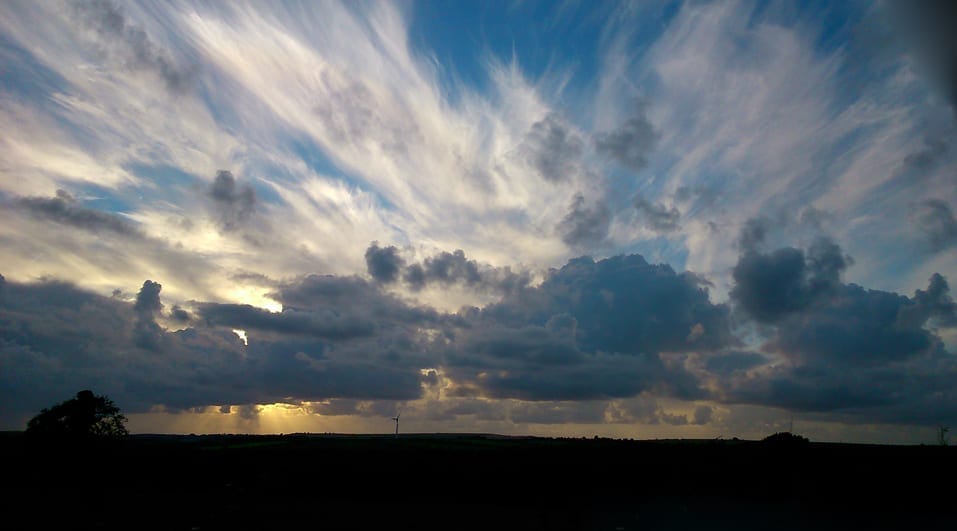Thoughts on Qi and the Weather
This photo (taken by me) is entitled “Sunset Over Cornwall.” On the 7th of July 2014, it was nominated cloud of the week by the Cloud Appreciation Society.
Humans are indivisible from Nature. In this way, health and disease are directly affected by it. Everything in Nature can be described in terms of qi. By definition, this means that we can observe and perceive the qi of the various seasons (the premise of this diary!) the qi of weather, and further still, the qi of a particular day.
“There is a qi of the Earth, a qi of the Sun and the Moon. There is the qi of the rarest jewel, as well as the qi of a dung heap. All phenomena share qualities and relationships based in their common origin of qi.” (Understanding Acupuncture by Birch & Felt.)
In this post I’ll explore the idea of the qi of climate and weather within the framework of the seasons. The goal is to reflect on how this might inform how a practitioner treats a patient, or how an individual manages their own wellbeing.
What is Qi?
“When you see a houseplant that is lacking water, hasn’t had enough light and has clearly been neglected, you will recognise the wilted leaves and dull tones of a living thing without what it needs for optimum vitality. We could describe this ‘deficient ch’i’. Conversely when you see a glossy-haired cat, with sparkling eyes, trotting lithely along a fence then leaping gracefully to the ground, only to curl up happily in the sun, you intuitively register the healthy vitality and liveliness of the creature. We could describe this cat as manifesting ‘abundant chi’.”
“The mind that directs vitality or changes the flow of ch’i might be our own, or the beneficial intention or skill of an acupuncturist or TCM (Traditional Chinese Medicine) practitioner. It might also be the wider effects of time out in nature, spent in meditation, or in cultivating healthy habits.”
Quote from Caroline Ross atUncivil Savant
In my herbal practice, I often observe the qi in a person’s eyes through the use of Iridology. A person is unlikely to go and see their GP if they notice that the light in their eyes has “gone out,” however to a practitioner of TCM this is a serious sign that “the master has left the house.” No special knowledge of medicine is required to spot a person who has lost their “spark.” (Sometimes described as shen in TCM)
Qi is also present in the food we eat and the company we keep. It can also be found in the energy of our home and work place, or the music we listen to.
One particular artist whose qi I feel most powerfully is Nick Drake. I recently dug out an old record player and played this album. I could almost smell the music.
Don’t you think this image is a nice portrayal of the concept of yin and yang?
The emotions and feelings portrayed in Nick Drake’s songs transcend the passing of time; creating a direct connection to the artists consciousness. This vibe has a very special quality and is a powerful form of qi. Even the image on the album cover shows a sort of comparison of qi; one resting and observing, the other dynamic and in movement. Neither form of qi is less alive or quickened than the other.
Observations of Qi in January
Qi is not something static. It takes many forms, some solid and perceptible, others more ethereal. Often it is dependent on the perceptions and mood of the observer. Within each season there is an element of both yin and yang. A careful observer will notice nuance which changes from day to day.
As a writer or practitioner, making notes on these subtle changes is a good way to learn how to step outside the western conventional way of viewing things in terms of boxes, clichés and stereotypes, without losing the essence of what the thing actually is.
Creating A Weather Diary
The sky is a tableau vivant; a scene of constant changing beauty. I wanted to somehow capture this idea by making a collection of metaphors to help contextualise qi and explore the concept from the point of view of the seasons and Traditional Chinese Medicine.
To do this, on days when I feel particularly affected by the weather I’ve started making notes on how it makes me feel - recording any words, metaphors or similes that spring to mind.
Here are a few tentative examples:
Thursday 18th Jan: Snow Day!
Snow creates a feeling of liminal space - a quiet time during which it feels completely acceptable to do nothing. Perhaps this is why it’s associated with Christmas - the one day of the year when it’s universally accepted that no work will get done. This sacrosanct moment is for resting and spending time indoors with family, friends and loved ones.
In 5 Element Theory, water is the element associated with Winter. The direction associated with water is the North - an area where freezing winds blow, and one can experience the majestic stillness of the frozen ice caps, below which dark and unknown currents flow.
Sunday 21st Jan: Storm Agnes
Today we experienced gales of up to 90 miles an hour. The sound of the wind and mood of the day felt very unsettling. The qi was dispersed, scattered, rebellious and sharp, putting all who dared brave the elements on edge with trepidation - stirring up in them the hubris of mad children, whooping and whirling like a unleashed banshee.
Wind can instigate the start of many disease processes. Nefarious wind attacks penetrate the body and stir up pathogenic factors that are subsequently aggravated by the cold, damp weather.
Monday 29th Jan: Cornish Mizzle
Rain that’s not really rain - or as the comedian Peter Kaye likes to refer to it in his famous sketch about the weather “that fine rain that soaks you right through!”
The landscape on my walk to work feels surreal. People hurry past to get out of the rain and seek the safe comfort of the warmth indoors. Faces are obscured by hooded rain coats and umbrellas.
People “save things for a rainy day.” There is less pressure to “do” and a natural inclination to spend time in thought - reading a book, knitting a jumper or just lounging about in a blanket watching afternoon TV. Outdoor jobs in the garden are swapped for pottering about in the shed or work in the poly tunnel, the heavy drops of rain making a soothing plopping sound on the plastic roof.
Today the qi feels slow, heavy, grey, safe and comforting, like snuggling up in a warm blanket and with a steaming mug of tea.
Writing Exercise:
During the course of one day, make a list of all the examples you stumble across where qi is abundant. This can include sounds (for example a booming voice or birdsong), images, poems, thoughts and of course the weather. Remember that qi is everywhere including within the animal and plant kingdom, in the food you eat, in objects such as rocks and crystals, as well as the people you meet.
Do the same, but list examples of where qi might be deficient. Compare and contrast your examples using any adjectives, similes or metaphors that feel appropriate.
Begin a weather diary. Use as many words and images as you can find to clearly describe your feelings about the quality of qi on that particular day.






